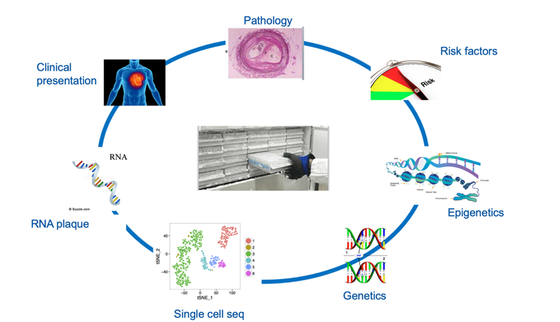Athero-Express
Patients eligible to undergo endarterectomy of the carotid or femoral artery to treat atherosclerotic disease in the University Medical Center Utrecht (and in the past the Antonius Hospital Nieuwegein) are included in the Athero_Express study. The current number of included AE patients is over 3500, some 2,400 patients underwent carotid endarterectomy, almost 700 "femoral" patients had surgery, and well over 70 other types of arteries were operated on. In all over 430 patients were operated for various types of aneurysms, the majority being abdominal aortic aneuryms. All patients are followed for a minimum of three years. For the original study design we refer to the the article by Verhoeven et al. (PMID: 15678794).
The biobank database encompasses many characteristics: pathological specifications, clinical characteristics, 3 years follow up, whole transcriptome analyses (n=700), whole genome methylation profile (n=700) and SNP data (n=2000), single cell sequencing data (n=45)

In Athero-Express, we discovered, among other things:
- That the composition of a plaque is predictive of the development of restenosis of the treated vascular segment (JAMA 2008)
- That expression of specific proteins in a plaque can predict whether the patient is at risk for a serious cardiovascular event in any other vascular area. (papers in Circulation, ATVB, Eur Heart J).
- That the composition of the atherosclerotic plaques that lead to a stroke have changed over the past 20 years due to changes in medication and lifestyle (Circulation 2014, Nature Rev Cardiology 2017)
- That there are large differences between men and women in the molecular and cellular composition of the plaques (Circulation 2020, several other journals).
- That results obtained in atherosclerotic genetically modified mice can only be confirmed in humans to a limited extent in genetic studies (ATVB 2016).
- A new categorization of plaques, based on transcriptomics analyses, that is strongly associated with clinical presentation and genes that change under the influence of medication (submitted Nature Comm).
In summary: in Athero-Express we have been able to influence thinking about existing dogmas in the field of arteriosclerosis with a unique amount of human data. The research aims to show that we will be able to revise the traditional view of the “vulnerable plaque” (sex-specific).
For an extensive outline of the content of the biobank and our main aims and objectives click here.
Key Publication uitklapper, klik om te openen
1. Timmerman N. et a.l Pre-Operative Plasma Extracellular Vesicle Proteins are Associated with a High Risk of Long Term Secondary Major Cardiovascular Events in Patients Undergoing Carotid Endarterectomy. Eur. J. Vasc & Endovasc. Surg. 2021 available on line https://doi.org/10.1016/j.ejvs.2021.06.039
2. Michal Mokry, Arjan Boltjes, Kai Cui, Lotte Slenders, Joost Mekke, Marie A.C. Depuydt, Nathalie Timmerman, Farahnaz Waissi, Adam W. Turner, Mohammad Daud Khan, Chani J. Hodonsky, Ernest Diez-Benavente, Robin J.G. Hartman, Noortje A M van den Dungen, Nico Lansu, Emilia Nagyova, Koen H.M. Prange, Eleftherios Pavlos, Evangelos Andreakos, Heribert Schunkert, Gary K. Owens, Claudia Monaco, Aloke V Finn, Renu Virmani, Nicholas Leeper, Menno P.J. Winther, Johan Kuiper, Gert Jan de Borst, Erik S.G. Stroes, Mete Civelek, Dominique P.V. de Kleijn, Hester M. den Ruijter, Folkert W. Asselbergs, Sander W. van der Laan, Clint L. Miller, Gerard Pasterkamp. Transcriptomic-based clustering of advanced atherosclerotic plaques: Revisiting the lesion characteristics that identify the vulnerable patient. Nature Comm, in revision.
3. Hartman RJG, Owsiany K, Ma L, Koplev S, Hao K, Slenders L, Civelek M, Mokry M, Kovacic JC, Pasterkamp G, Owens G, Björkegren JLM, den Ruijter HM. Sex-stratified gen regulatory networks reveal female key driver genes of atherosclerosis involved in smooth muscle cell phenotype switching. Circulation 2021;143:713-726.
4. Depuydt MAC, Prange KHM, Slenders L, Örd T, Elbersen D, Boltjes A, de Jager SCA, Asselbergs FW, de Borst GJ, Aavik E, Lönnberg T, Lutgens E, Glass CK, den Ruijter HM, Kaikkonen MU, Bot I, Slütter B, van der Laan SW, Yla-Herttuala S, Mokry M, Kuiper J, de Winther MPJ, Pasterkamp G. Microanatomy of the Human Atherosclerotic Plaque by Single-Cell Transcriptomics. Circ Res 2020 Nov 6;127(11):1437-1455
5. Libby P, Pasterkamp G, Crea F, Jang IK. Reassessing the Mechanisms of Acute Coronary Syndromes. Circ Res. 2019 Jan 4;124(1):150-160.
6. van der Laan SW, Siemelink MA, Pasterkamp G. Genetic Susceptibility Loci for Cardiovascular Disease and Their Impact on Atherosclerotic Plaques. Circ Genom Precis Med. 2018 Sep;11(9):
People Involved uitklapper, klik om te openen
Arjan Boltjes
Contact uitklapper, klik om te openen
Prof. Dr. Dominique de Kleijn
